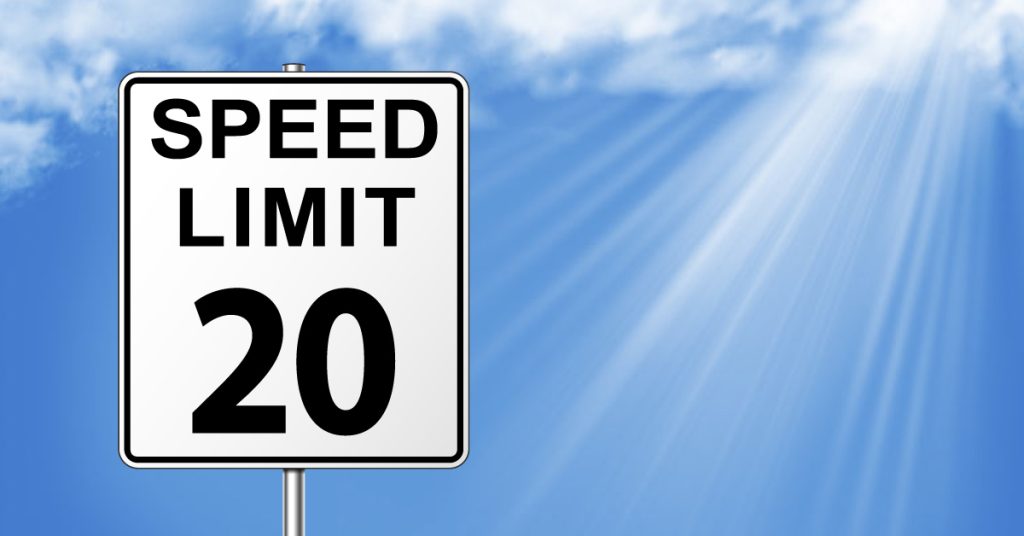City of Boston Pursues 20 MPH Speed Limit to Reduce Traffic Fatalities and Pedestrian Injuries

In Boston, city officials are interested in lowering speed limits to 20 mph in neighborhoods to reduce traffic fatalities. The proposal comes just two years after the city lowered speeds from 30 to 25 mph and will require state approval.
First, the City of Boston dropped speed limits to 25 mph, with a goal of reducing traffic fatalities and pedestrian injuries. Now, Mayor Marty Walsh and the Boston City Council have their eyes on 20 mph on neighborhood streets. The next step is obtaining state approval.
The City of Boston first sought to lower speed limits as part of its VisionZero campaign a few years ago. That proposal also required approval from the state Legislature and Gov. Baker’s signature.
Gov. Baker signed the Municipal Modernization Bill into law in 2016, including language that allowed cities and towns to lower the default speed limit from 30 to 25 mph. Cities and towns can now lower speed limits on all (or select) municipal roads in thickly settled areas or business districts. Many communities have done so, including Boston, Cambridge, Quincy, Arlington and Dedham. Now, unless traffic signs are posted otherwise, it’s 25 mph in these communities.
While the speed limit in these communities has dropped, the fines remain the same. In Massachusetts, speeding carries a $105 fine for speeding. If you exceed the speed limit by 10 mph, there is an extra $10 fine per each mile per hour.
Boston was the first to approve lower speeds, with this taking effect in January 2017. But the City of Boston’s goal was always 20 mph and remains so for city neighborhoods. In fact, the Boston City Council approved a 20 mph speed limit back in 2016.
As the City of Boston pursues a 20 mph speed limit for neighborhoods, there is early data showing that the 30 to 25 mph drop has changed traffic patterns for the better. According to an Insurance Institute for Highway Safety study, after the lower speed limit took effect, Boston saw a 29 percent reduction in traffic traveling over 35 mph.
Mayor Walsh also announced other transportation initiatives last week, including the creation of special drop-off and pick-up sites for Uber, Lyft and other ridesharing vehicles. Data from the Massachusetts Department of Public Utilities confirms that Boston is the truly the hub of ride-hail services. During 2017, nearly 35 million rideshare trips began in the city. Boston saw more than 6 times as many rideshare starts as Cambridge, which has the second largest presences in Massachusetts.
Walsh’s other proposal is to give every student in the Boston public school system a MBTA pass. The price tag hasn’t been negotiated yet with the MBTA. Currently, the city receives a subsidy from the MBTA and pays $5.6 million for MBTA passes for students in Grade 7 and 8 who live more than a mile and a half from their schools.
Data That Supports 20 MPH
- According to the VisionZero Network, 9 out of 10 pedestrians who are hit by a vehicle traveling 20 mph survive. Increase the speed to 30 mph and the survival rate drops to 50 percent. At 40 mph, just 10 percent of pedestrians survive.
- Speed is a factor in nearly one-third of all traffic deaths in the U.S. (Source: VisionZero Network).
- Speeding crashes claimed the lives of 59,374 people on U.S. roads from 2010 to 2015 (Source: VisionZero Network).
- Cars speeding through red lights are a leading cause of urban car crashes, according to the Insurance Institute for Highway Safety. Some states and local communities permit use of red light and speeding cameras to improve enforcement. But many do not, including Massachusetts and our neighboring New England states. Rhode Island is the one exception, allowing red light cameras by state law and city ordinance. State law permits use of speeding cameras in school zones on weekdays.
Related:
Walsh to propose 20 mph limit in neighborhoods and new Uber, Lyft pickup sites, Boston Globe, March 7, 2019
Slow Down! Boston, Cambridge and Other Cities Have Dropped Speeds to 25 MPH, Massachusetts Injury Lawyer Blog, May 23, 2017
Boston Car Accident Lawyers – Boston Pedestrian Accident Lawyers
Free Legal Consultation
The Boston law firm of Breakstone, White & Gluck has represented those injured by negligence since 1992. Our attorneys have over 100 years combined experience handling motor vehicle accident and pedestrian accident cases for clients. If you have been injured in a car crash caused by speeding, learn your legal rights. For a free consultation, contact our Boston car accident attorneys at 800-379-1244 or 617-723-7676 or use our contact form.

